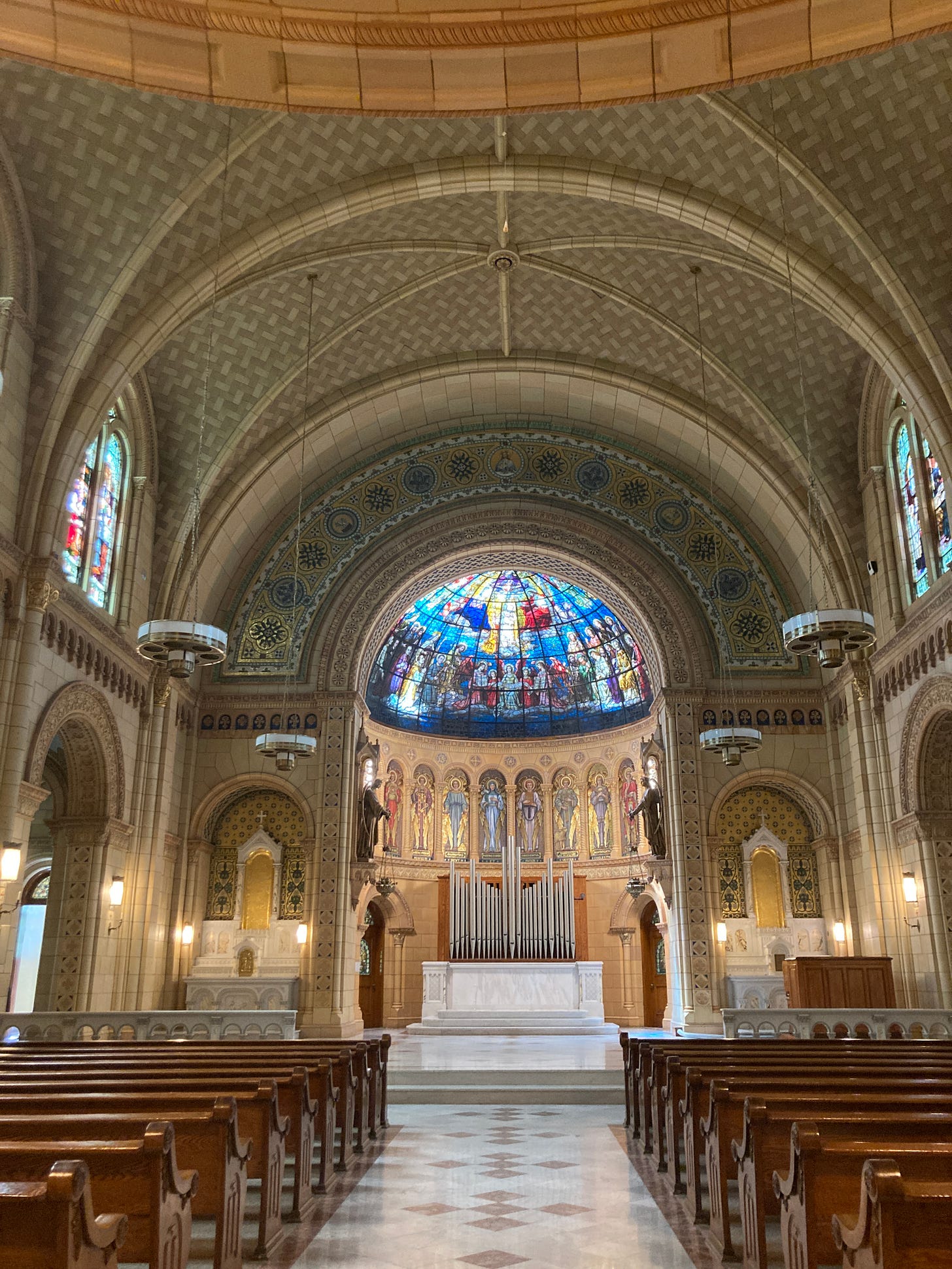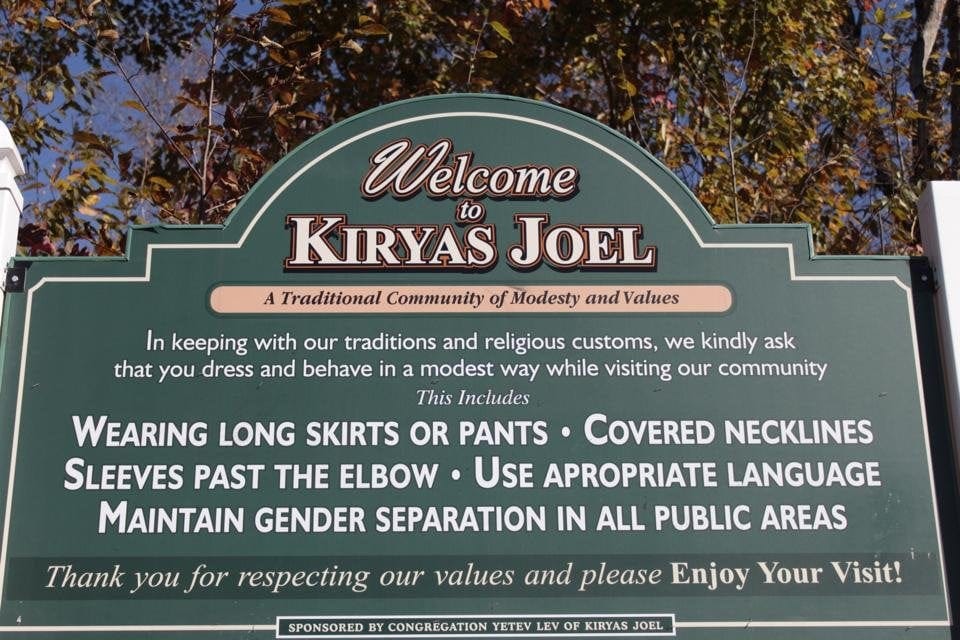A Weekend at An Anabaptist Castle
And tips on how *not* to write thinkpieces with Plough Quarterly
A Facetime conversation with my toddler over the weekend:
“Baby, look! Mama’s living in a castle. Does that make me a princess?”
—*Decisive nod* “Yes. Have a necklace.”
“Oh, yes, I do have a necklace! Do you?”
—“Yes. Daddy too.”
“Does he?”
—“Yay!” *frame jiggles as she jumps* “We all princesses!”
Jews and Jailbirds
A couple weeks ago, I attended a weekend conference for young writers hosted by the Bruderhof, the international Anabaptist commune that runs the magazine Plough (or “Pluff” as one friend calls it).
To get there, I drove four hours across New York state. The sky was blue. In the last hour or so, I noticed diner letter boards switching from “Friday night fish fry” to “Thursday night bingo.” I wondered what it meant, this change of day. Then, I drove through Kiryas Joel, and it clicked.
I was suddenly trundling through the most Jewish town in America. Swarms of black-coated, long-bearded men crowded the streets like Abe Lincoln impersonators.
Coming from the small-town Midwest, and then Montana, I’ve met my share of Amish buggies and Mormon missionaries. Hasidic Jews, though, are new to me. The doorframe of our apartment has a small, Hebrew-inscribed box instead of a doorbell. “Me-zu-zah.” The word buzzes on my lips like a kazoo. The only Jews I ever knew were Messianic or secular, so it’s delightful to find some holy weird ones (for an expansion on the topic of holy weirdness, check out this post).
I made it through Kiryas Joel without getting out of my car, which was a good thing because I didn’t see one woman on the street and couldn’t have possibly stayed gender-separated (per the welcome sign pictured above). Perhaps the Hasidic Jews really do abide by Tevye’s dictum from Fiddler on The Roof: “Men study! Women in the kitchen.” (I prefer the punctuationally abridged— “Men study women in the kitchen.”)
Soon after, over the treetops, I caught a glimpse of a massive dome and wondered what eccentric billionaire had built a fortress on the Hudson. Turns out it’s a maximum security prison, originally called the "Eastern New York Reformatory.” I suppose the prisoners didn’t end up reforming because it’s now called, much more modestly, the “Eastern Correctional Facility.”
Anabaptists and Roman Catholics
I knew Mount Academy in Esopus was my destination, but I had imagined the typical bricky, prison-like high school. I made a sharp left into gated grounds and crept timidly down a curved drive to find myself facing… Pemberley? Downton Abbey? Something, at any rate, that looked oddly kin to the castles I’d just seen in France.
A fantastical place, huh. Not the type of place you’d expect German Anabaptists to build.
Turns out they didn’t. Redemptorist priests hired a European architect to design it in the early 1900’s. They spared no expense.

The Bruderhof community bought and renovated it in its twilight years, converting the former seminary into a high school. The ecumenical character of their community shows in how painstakingly they’ve preserved all the Roman Catholic art, installing dehumidifiers to protect paint and plaster from decay. There is kinship there. As a community that believes in holding all things in common, the Bruderhof almost resembles a monastic order. In fact, I’ve heard a member describe their lifestyle as “monasticism but with families.” (The building even has a brewery!)
I’m not going to describe the weekend further (I’m tired etc.), except to say that it was lovely, and if you are under 35, you should apply next year. I will, however, share some notes for those of you interested in writing for pubs like Plough.
Do’s and Don’ts
First, for those of you who’ve never heard of it, Plough’s an ecumenical and refreshingly nonpartisan publication that focuses on Life’s Big Questions. Recent issue themes include “Freedom” and “Health.”
On the way home, I found myself comparing Plough’s advice with last year’s WORLD Magazine bootcamp. The two publications have different focuses, and they taught me two completely different writing philosophies. WORLD was definitely committed to traditional newspaper journalism. They taught us to carefully scrub all traces of ourselves from our work like cat burglars in soft, black gloves and balaclavas. The week’s litany was “Don’t editorialize!” Plough, on the other hand, seems to have accepted the death of traditional, “objective and unbiased” reporting. Its style is closer nonfic fiction, what people might call literary nonfiction or New Journalism (perhaps even veering on autofiction). This style is less wary of the writerly “I” and allows more poetic description. It’s a step away from sparse, facts-only stuff.
But don’t think they’ve lost integrity or surrendered to becoming just another super-partisan Internet echochamber. To the contrary, Plough painted the ideal magazine as a sort of safe haven from the internet’s theories-of-everything, pandering punditry, and hot takes. While WORLD emphasized letting the sources speak for themselves, Plough emphasized letting the stories speak for themselves. Instead of telling us not to editorialize, Plough told us not to pontificate. While the two publications differ in focus, they’re both committed to writing that opens a window into the world.
K, here are my notes:
DON’T: Pitch magazines rapidly and wildly. // DO: Take time to get to know magazines before pitching them.
DON’T: Be a pundit with a pet issue/soapbox // DO: Let your essays be a voyage of discovery.
DON’T: Try to write “objective” or narrator-free journalism. Times have changed. // DO: Start off writing scene reports instead of personal essays (because, let’s face it, you’re not that interesting).
DON’T: Waste people’s time // DO: Use rigorous data, facts, and fact-checking
DON’T: Worry about potential haters // DO: Let your weird side out
DON’T: Be on social media (because of its propensity to lead to #6) // DO: Keep an observation notebook.
DON’T: Discourse about the discourse. (Litmus test: Could your essay be cut-and-pasted from the comments section of another piece of writing?) // DO: Center your essay in stories about concrete, real things from real life.
DON’T: Worry about what other people are writing // DO: Use essays you like as models
DON’T: End with a “takeaway” // DO: End with an emotionally forceful image or event
I’m embarrassed at how familiar the “don’ts” seem. They explain many of the rejections I’ve gotten from magazines over the last two years. But I also wonder whether hearing these rules beforehand would’ve prevented me from making the same mistakes. Some of us just have to learn the hard way.
I really am grateful for the chance freelancing has given me to fail my way into success. There’s nothing so freeing as to realize that you can fall down and get up again. Classroom-style learning is helpful and can prevent you from making dumb mistakes, but I’ve always been a classroom-educated person. It’s only been recently that I’ve discovered entrepreneurial learning and how fun it is to try to make it on your own with real stakes in the real world. Exhilarating.
Well,
Cheers to new adventures.
Thanks be to God for beautiful buildings and faithful Christians.
And thanks for reading this blog.
Let me know if you read Plough, or write for them, and please recommend your favorite magazines in the comments.










I subscribed to Plough last year after coming across a couple of their articles and being impressed with the quality of the writing and variety of subject matter. Every issue, I learn about something new and people I’ve never thought of. I also liked the idea that I would get a print magazine and get my face out of my phone every now and then.
I appreciate the Christian focus as it gives a shape and a depth to the way the topics are treated. On the other hand, it can make the magazine uncomfortable to read at times because it feels like there’s an expectation of me as a reader that I don’t typically experience scrolling Substack or whatever. LOL. I’m not sure I will renew my subscription at the end of this year, but maybe I should just for that reason.
It actually took me several months to figure out the magazine was connected to Bruderhof, in part because I’d also never heard of that organization. For the most part, I’m still pretty impressed as for a pretty low cost, it’s a very interesting publication and each issue is different. I’ve subscribed to things like Scientific American in the past and apart from the tiresome politics that have taken over every magazine I read growing up, every issue seemed much the same: it was like they reused the same ideas over and over and just switched the titles up a bit.
I can't wait to hear more about the full weekend! (I have enjoyed all the Bruderhof and Plough readers I've encountered in person and via email.)
Plough is a strange beast, but in a good way: I got to write a long reported piece for them in 2023-24 but haven't had such luck since with pitches since (also reported essays). The omnivorous Christian unpredictability I love about the publication as a reader certainly makes it difficult to pitch something perfectly in line with what the editors want.
The other thing I've noticed: Plough values how its writers live their vocations, or how they find the people doing that. Given the total community of the Bruderhof, that makes perfect sense (and great reading).